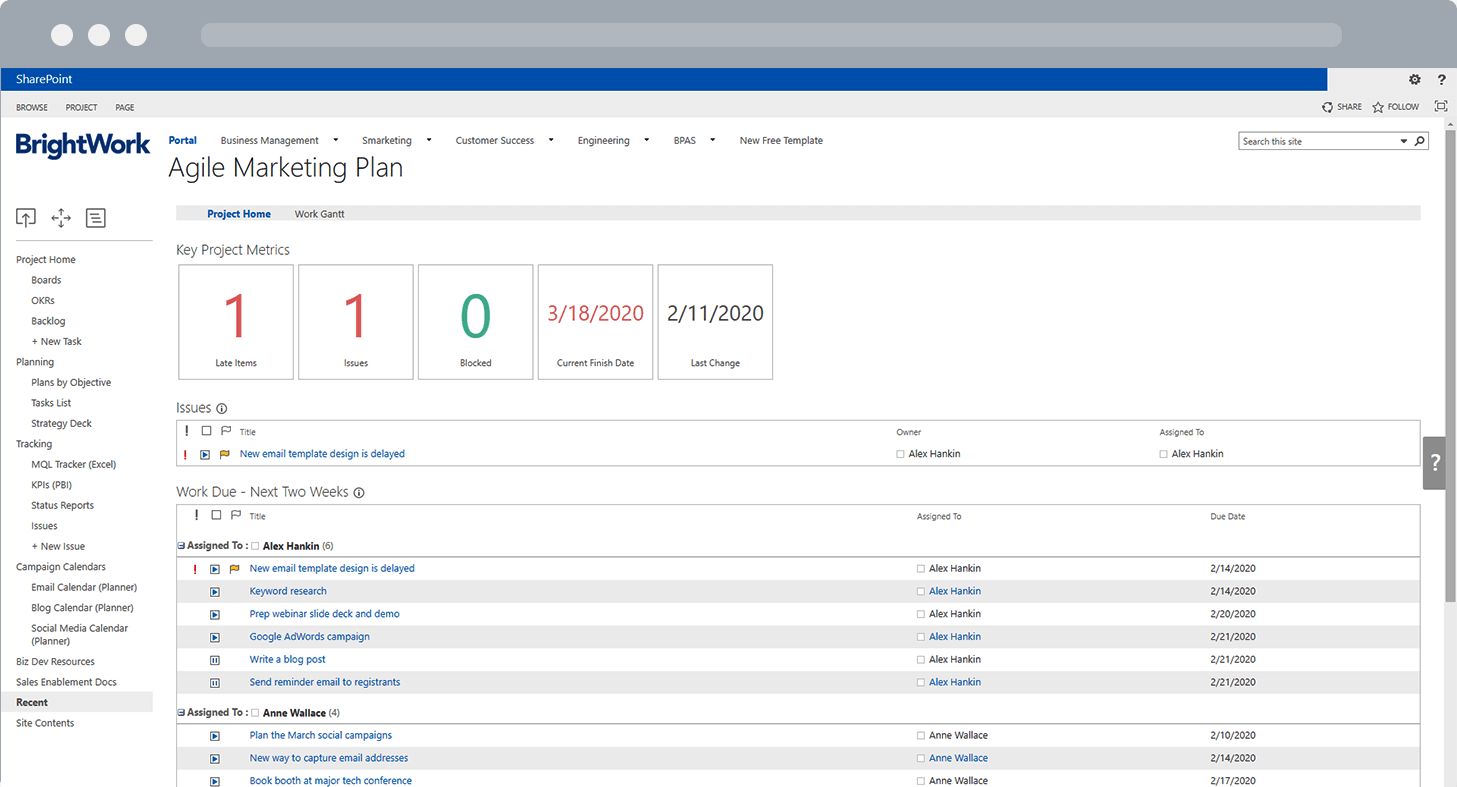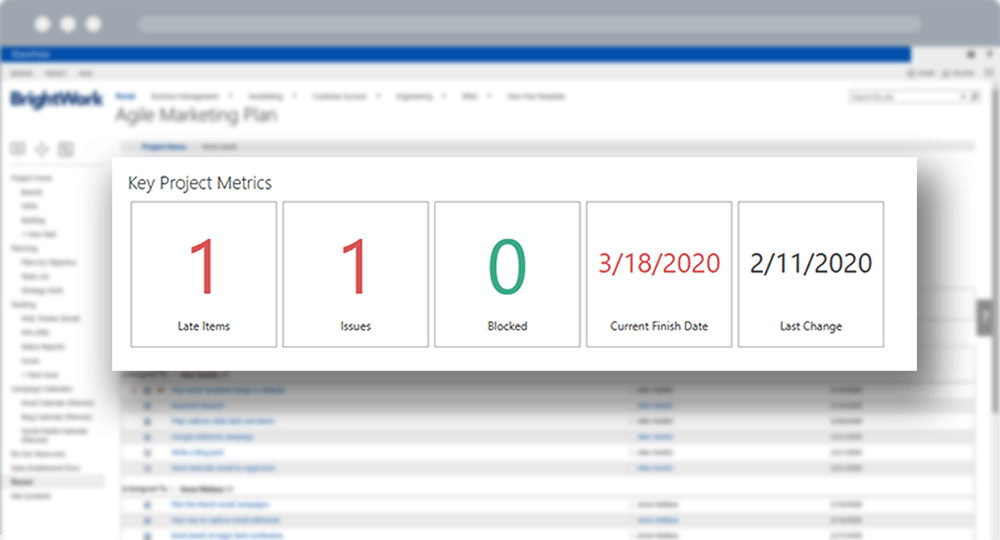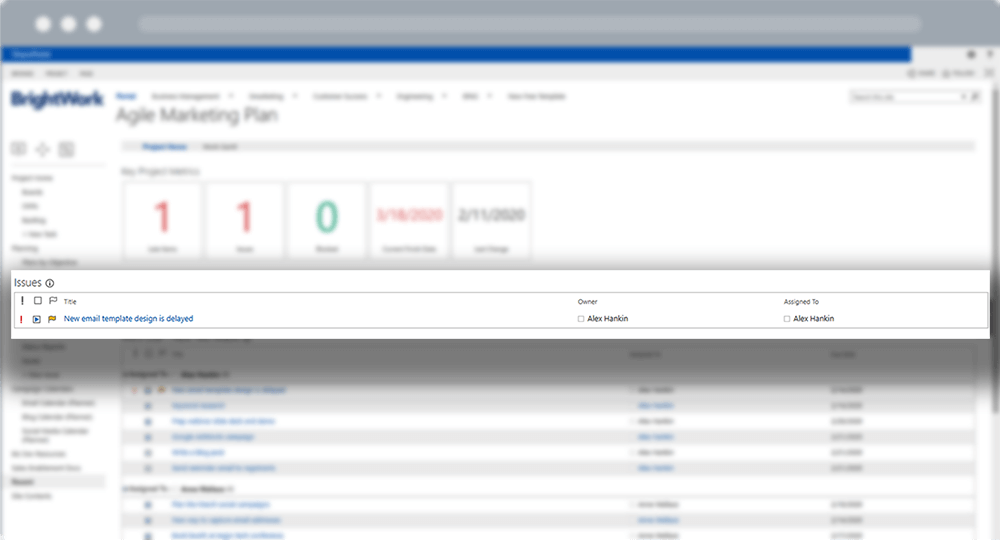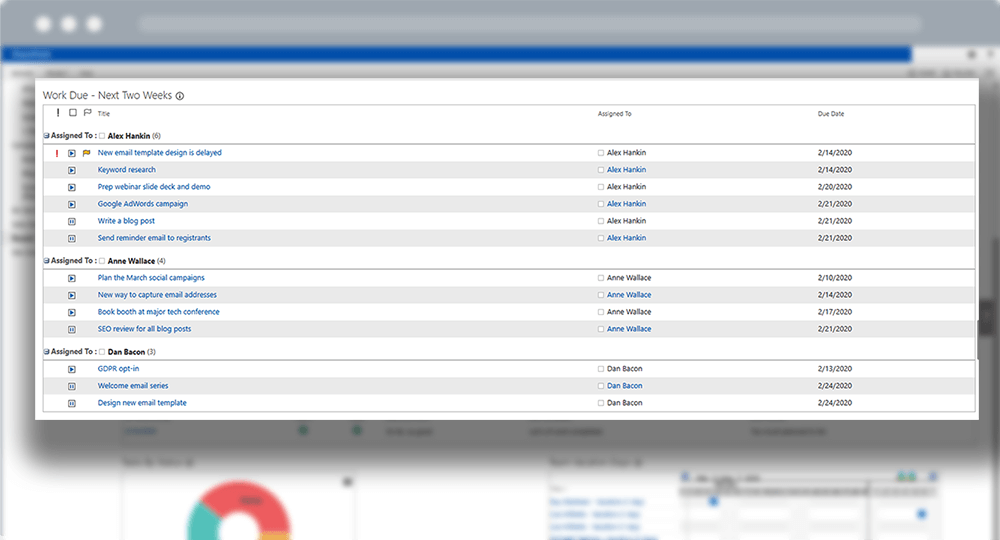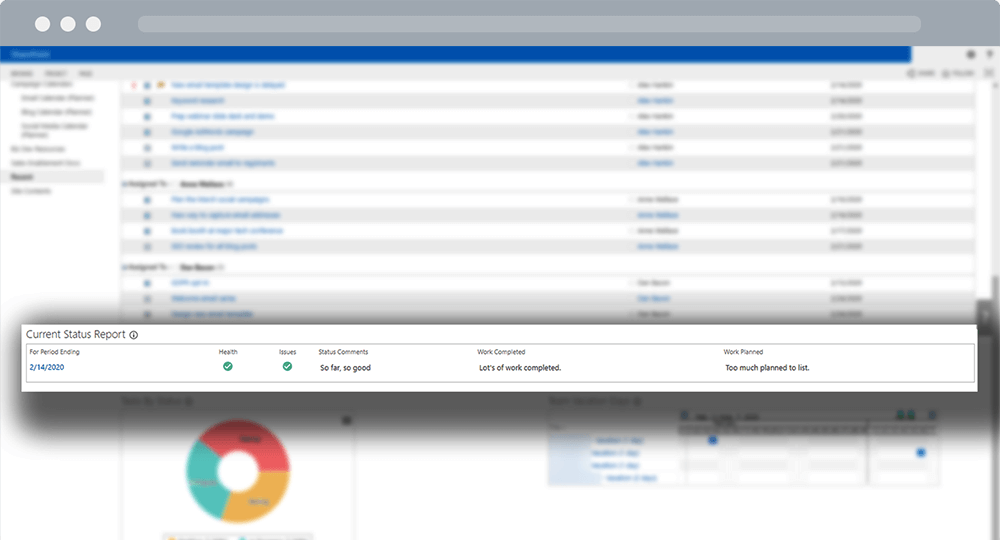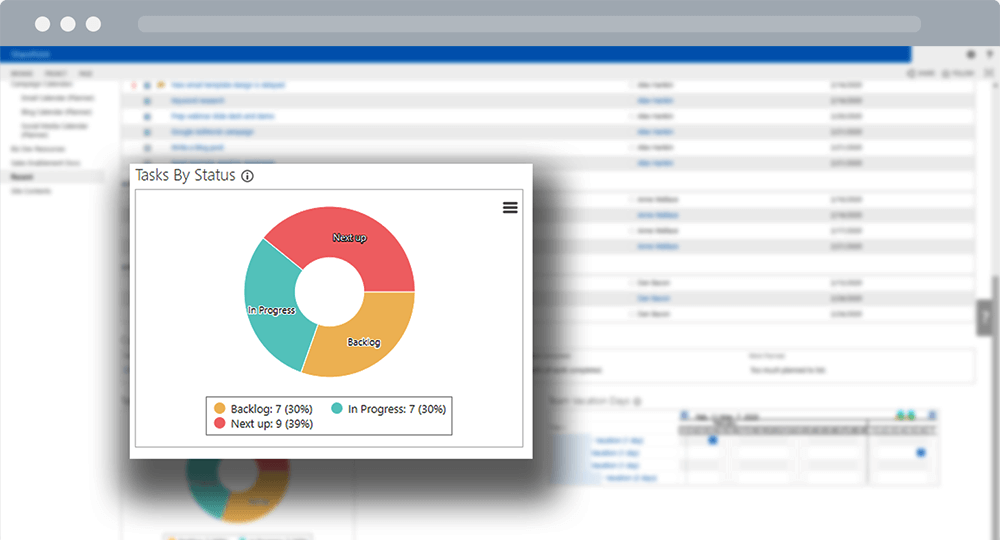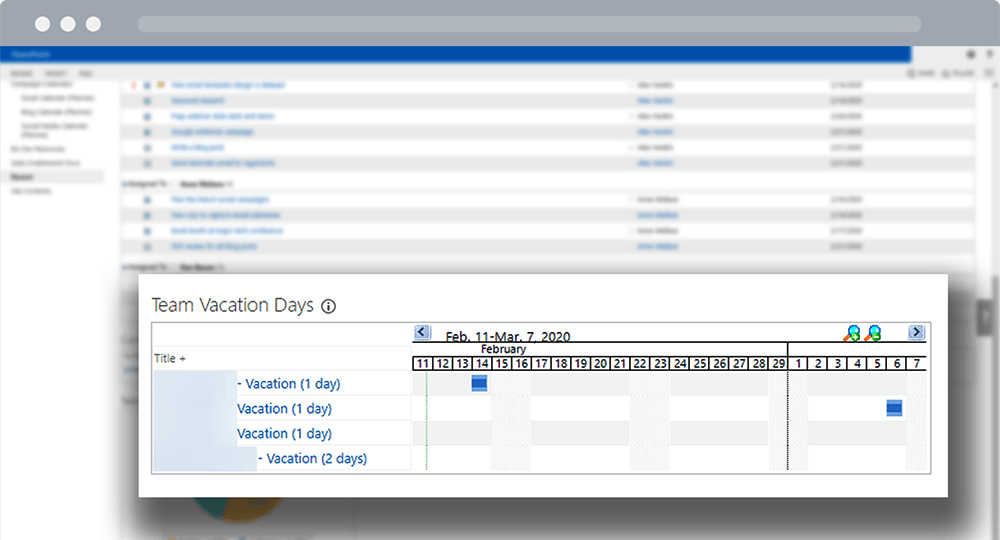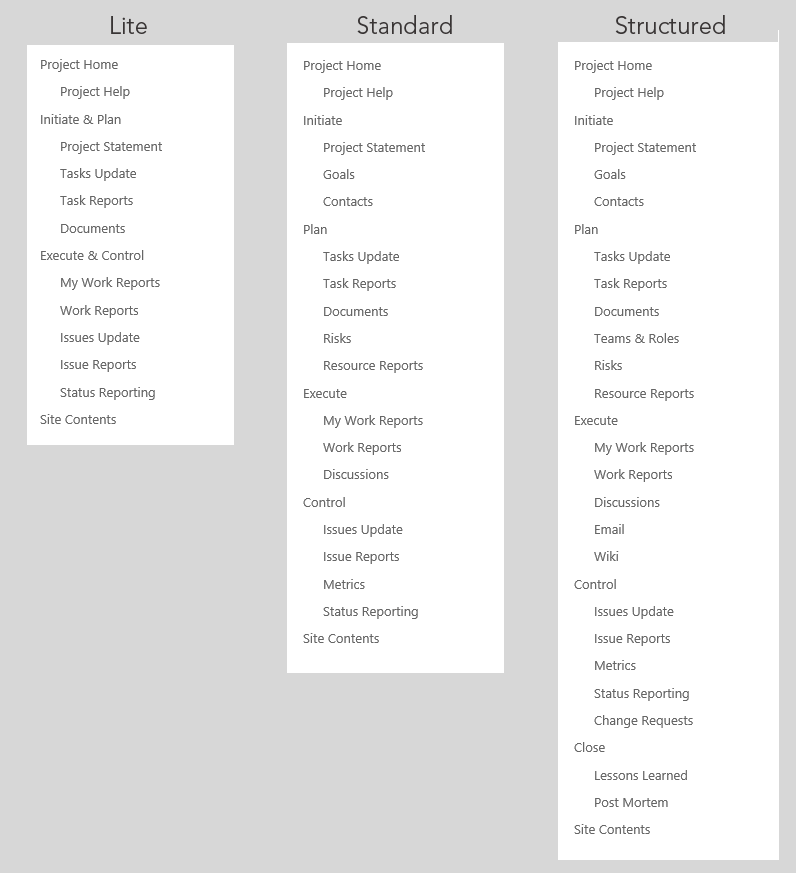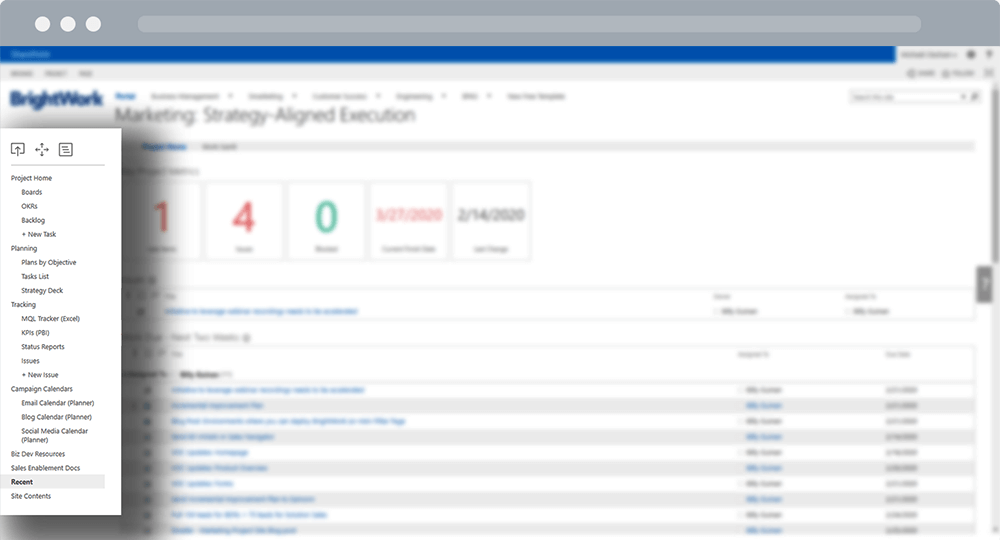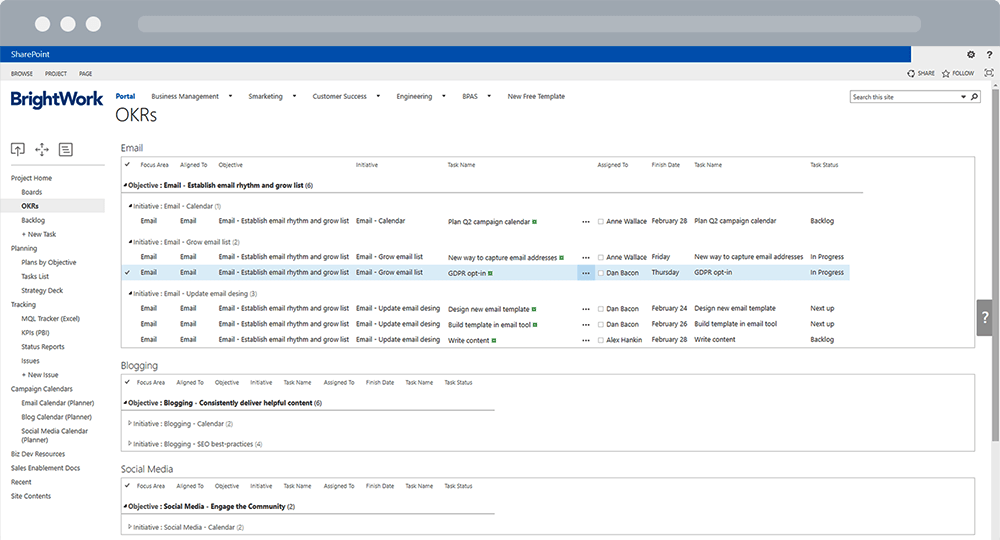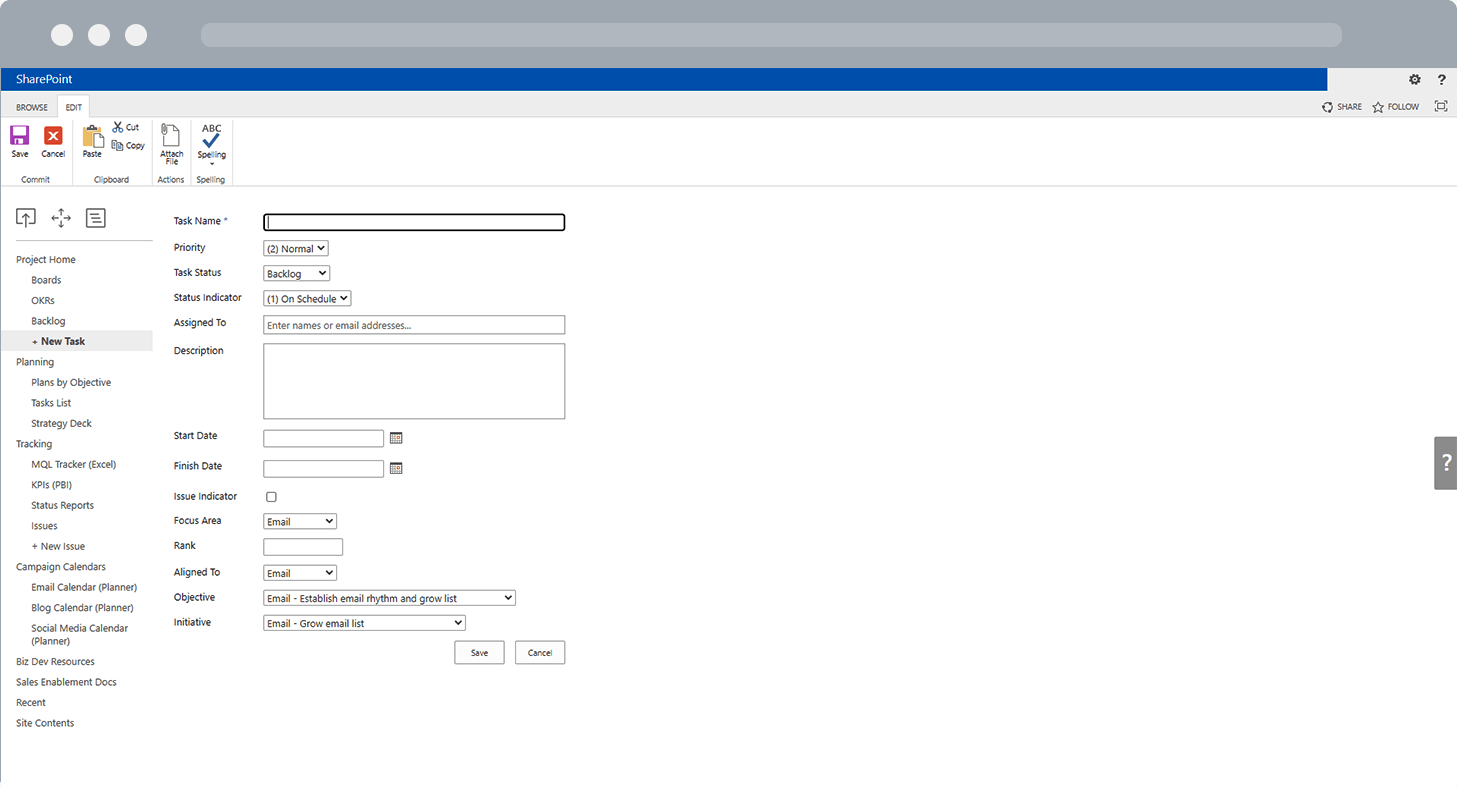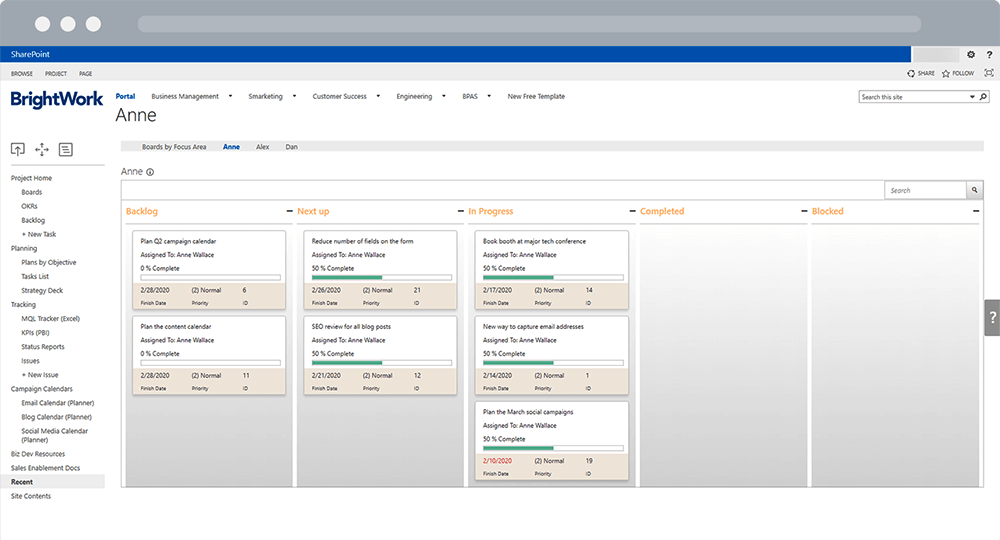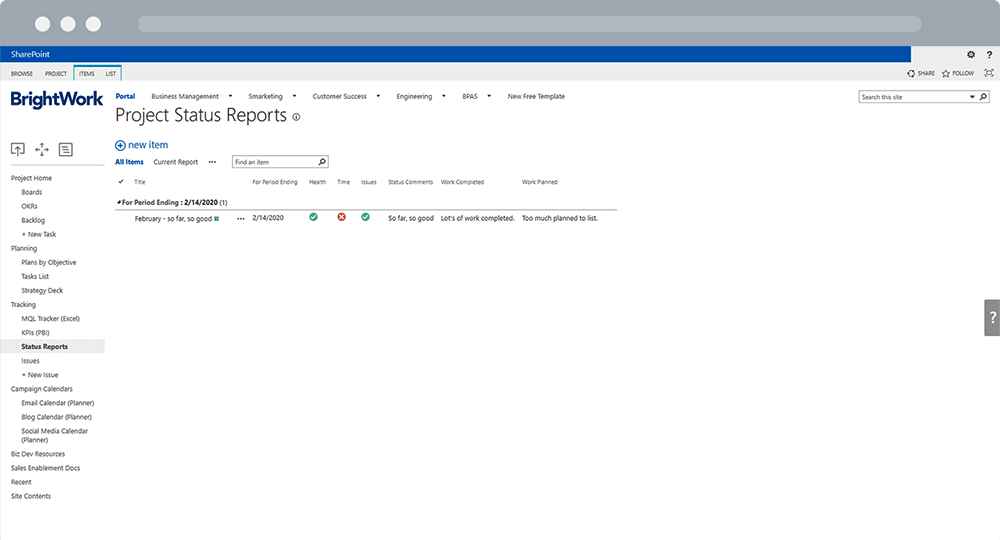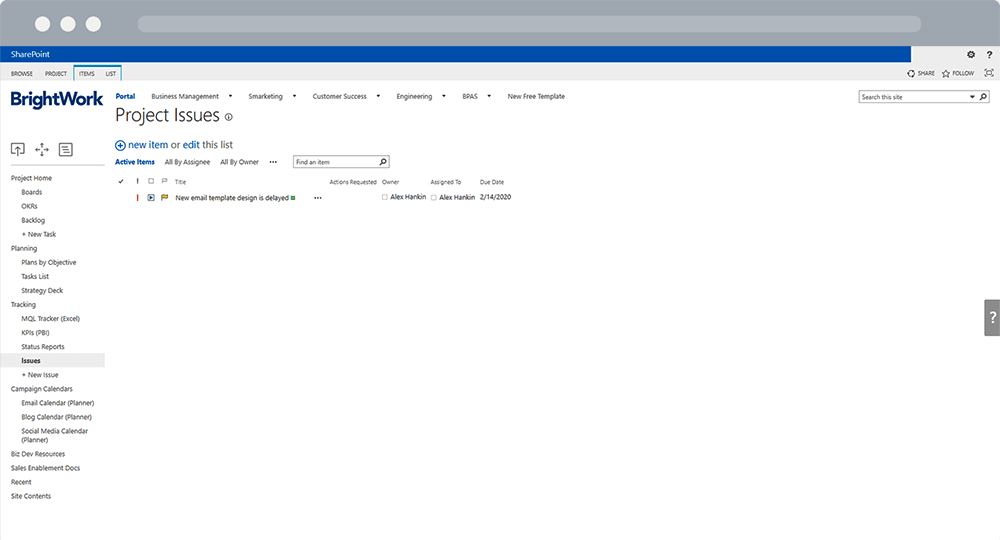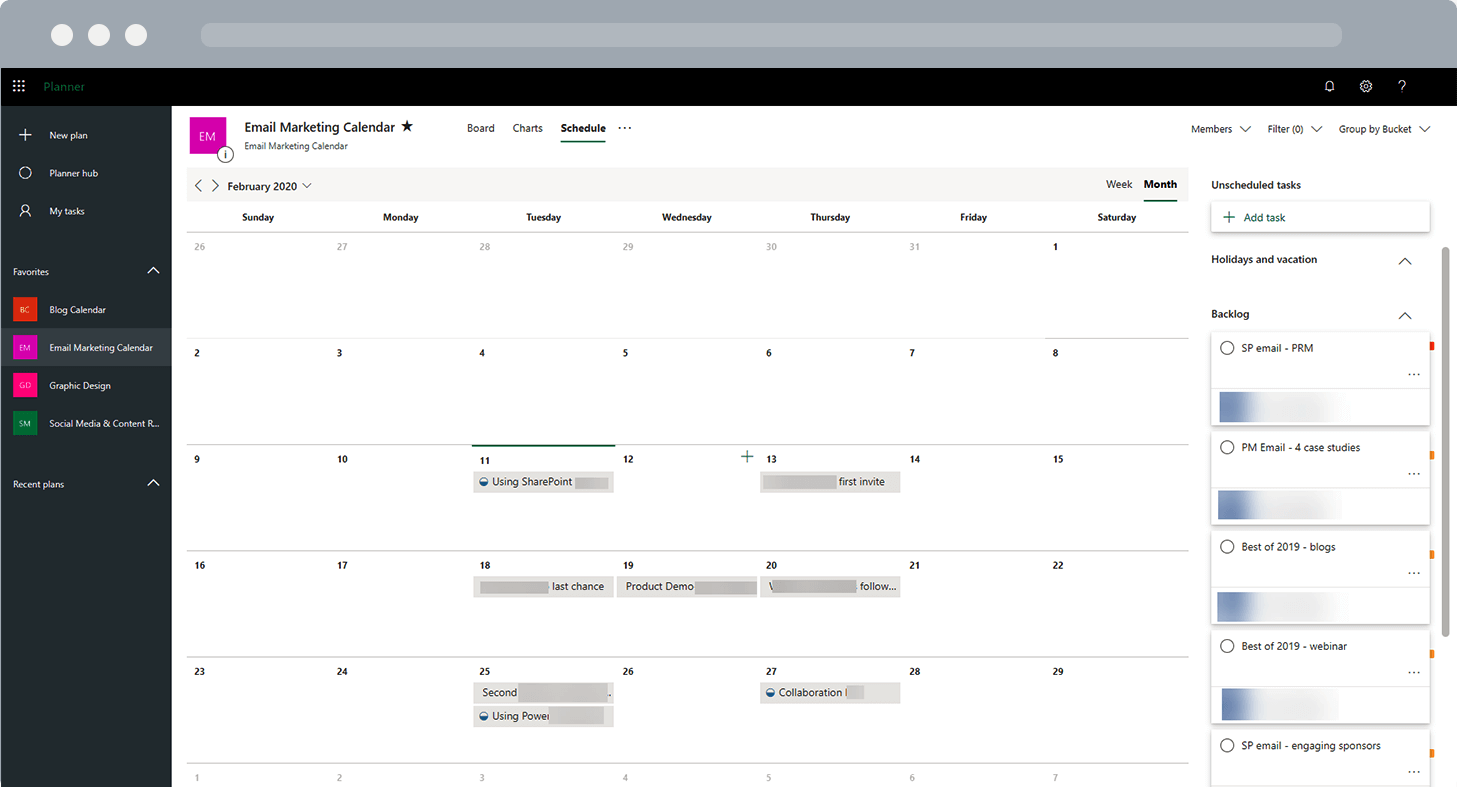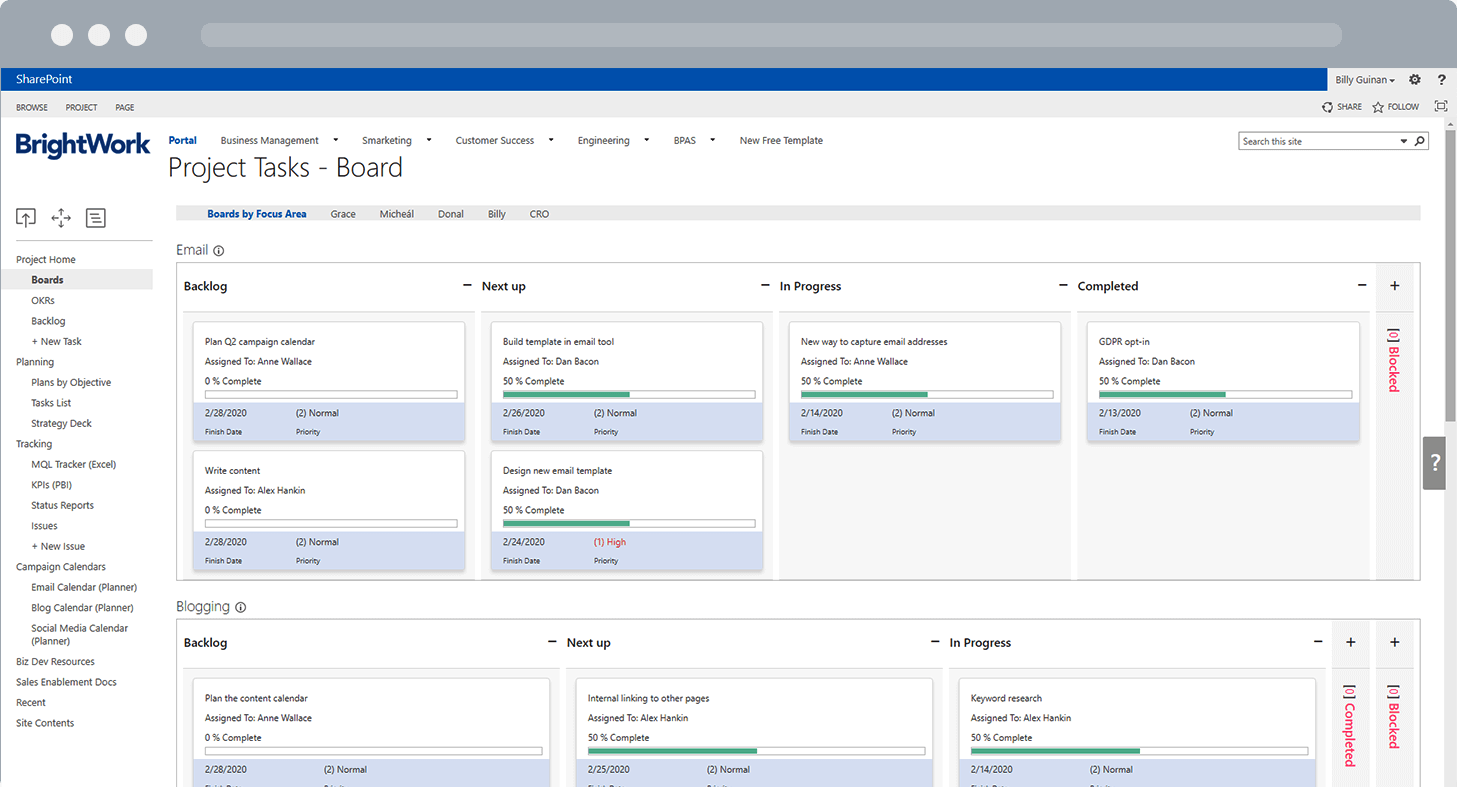I’m the BrightWork Marketing Team Lead.
And like any team in every organization, we have work to track and projects to deliver.
We have marketing campaigns to run, content to publish, web pages to maintain, and events to deliver.
Just like any other project team, we need to track our work in a simple and efficient way.
It has to be agile.
And seeing as we work at BrightWork – project and portfolio management software for SharePoint – we use our own tool to manage our marketing projects of course!
I’ve been in marketing a good few years now, and I can say that SharePoint is actually one of the best marketing project management tools out there.
Using SharePoint as our marketing project management software, we’re able to:
- Manage all marketing campaigns and work in one place.
- Identify blockers and issues preventing our team from doing our best work.
- Reduce the admin burden on the team so we can focus on what we do best – generating demand for BrightWork.
In the rest of this blog, I’ll walk through the BrightWork Marketing Team’s SharePoint site, and explain how it is configured to match our processes and increase our efficiency.
The beauty of using SharePoint is we have been able to configure the site to match our strategy exactly and support the way we manage our marketing initiatives.
SharePoint is so easy to use that this site was designed by the Marketing Team, for the Marketing Team, without any technical assistance from our product team.
Let’s take a look at the highlights of our BrightWork site for managing marketing projects.
Picking the right SharePoint Template for BrightWork Marketing projects
Those of you familiar with SharePoint will be familiar with the concept of the SharePoint Team Sites.
SharePoint Team Sites are essentially a website for each project, where you can plan the project schedule, track work and issues, and organize project deliverables.
BrightWork leverages this idea and delivers SharePoint Templates that are essentially Team Sites pre-configured to manage a project.
BrightWork comes with a range of pre-configured project and portfolio management templates for SharePoint with varying levels of project and portfolio management processes embedded.
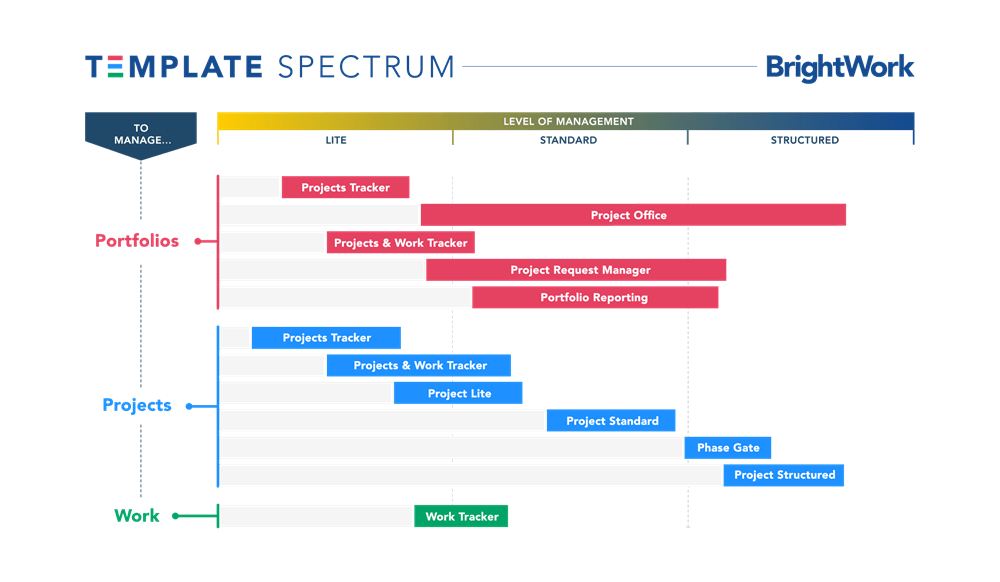
My team chose the BrightWork Project Standard Template as the basis for our marketing project management site.
The Project Standard has a bit too much process for our needs, but we wanted the ability to use the in-browser task scheduler if needed (which is not available in Project Lite).
So we started with Project Standard and stripped out the lists and web parts that were not relevant to us at the time.
Our Marketing Project Dashboard
One of the key pages in any BrightWork site is the Project Homepage.
The Project Homepage is a dashboard summary report of all the work that is currently in flight.
We have configured ours to show the information that keeps our marketing work moving forward.
The first thing we see on our site are the Key Metric Tiles.
The key metrics immediately inform us if there are any delays or issues affecting the execution of marketing work – including Late Tasks, Issues, or Blocked items.
Next, there is a web part displaying current Open Issues.
The Issues report tends to become a focal point for meetings and conversations, where we discuss the actions we are going to take to fix these issues.
Just below that on the dashboard, there is the list of Work Due Soon, grouped by the team member responsible.
The report shows work due in the next two weeks or work that has a start date less than or equal to one week in the future.
These filters give the team a snapshot of all the marketing work that either has a deadline coming up soon, work due to start soon, or tasks that should at least be kicked off and in-progress by now.
Then there is the latest Project Status Report, which is entered into the site on a weekly basis.
Any stakeholder in marketing can come to the site, look at the status report and get a sense of the current state of play, what has happened recently in Marketing, and what work is planned for the upcoming marketing sprint.
Rounding out the dashboard are a few other reports.
The Tasks by Status chart gives a quick glance at the overall progress of the work logged in the site, so we can answer questions like:
- Is our backlog growing and growing, without any work actually getting done?
- Are there a lot of blocked items?
- Are there too many in-progress tasks, with throughput being an issue?
The chart is a quick visual cue to help surface any issues and increase the speed of execution.
There is also a simple Gantt chart of any upcoming team vacation days.
The vacation report pulls right from the central BrightWork vacation portal, so we know when team members will be out of the office and can plan accordingly.
How we organized the Quick Launch around our marketing project management processes
Another key aspect of a SharePoint Team Site is the Quick Launch.
The Quick Launch is a menu on the left-hand side of the site that has links to the various plans, reports, and libraries for the project.
Out-of-the-box, the Quick Launch in BrightWork templates are organized according to the project management methodology.
As you move up from Project Lite to Project Standard or Structured, the Quick Launch expands, exposing additional project management dashboards.
We have modified our Quick Launch so that it is organized to support an agile marketing process.
It has four key sections:
- Project Home
- Planning
- Tracking
- Campaign Calendars
Future blog articles will dive deeper into these sections and how they all work together in SharePoint.
Project Home
The top of the Quick Launch has all the most important links for Team Members and stakeholders.
Here they’ll find links to the Marketing Project Dashboard (described above), as well as links to our backlog, and our OKR management system*.
*The entire BrightWork marketing strategy and plan is organized by OKRs (or Objectives and Key Results).
Our marketing plan and initiatives are all aligned to one of these objectives, so the BrightWork Marketing Site is optimized to support that process.
We’ve also added a “+ New Task” link so we can open a new task form from anywhere in the site.
It’s a very handy way to log action items from meetings or whenever an idea strikes.
But the most important link, I think, is to the Marketing Kanban Boards in SharePoint where the whole team gets transparency and visibility into work.
Kanban Boards are a fantastic way to visualize workloads and anticipate when bottlenecks might occur.
Planning
Planning is what you would expect.
Here we have links to the main Tasks Lists, as well as the plans by each objective in our marketing plan if we want to zoom in on one particular area or initiative.
We also include a link to our Marketing Strategy Deck, for anyone that needs a refresher!
Tracking
Tracking is a mix of links out to our KPI dashboards in Excel and PowerBI, as well as some key reporting dashboards in our marketing project management site in SharePoint.
For instance, we log a Project Status Report every Friday with a summary of the week.
The most recent status report also appears on the project homepage dashboard.
We also have an Issues list where anyone on the team can flag a task or raise an issue so we can come up with a solution and get our work back on track.
Campaign Calendars
No marketing program would be complete without campaigns, and we’re no different!
We maintain our marketing and editorial calendars to ensure we have a consistent flow of messaging and content going out that is helpful to our audience.
So in this section, we have easy access links to the:
- Email schedule
- Blog calendar
- Social media calendar
All three of these are actually linked to Microsoft Planners that we use to manage our content calendars.
Leverage Kanban Boards to visualize marketing work
Kanban Boards enable teams to move through work quickly, addressing risks, tasks, and issues in a visual, modern way.
BrightWork leverages the idea of Boards to bring task management and agile project management to a new level in SharePoint.
On the Marketing Team, we use boards extensively to manage our tasks in a visual way.
We have Boards that are aligned to our key marketing objectives and initiatives.
But we also have Boards for each individual on the team.
All of these Boards are drawn from various views of our one main Tasks List in the SharePoint site.
Having all of our marketing work tracked in one site from one Tasks List means that if we update work on any board, or any tasks list, all the reports in the site will automatically be updated as well.

